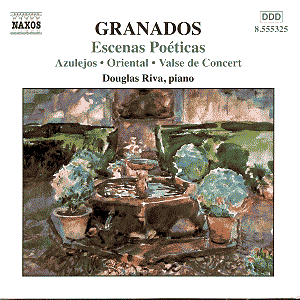Naxos’s traversal of Granados’s piano music has now
reached Volume 5 and gives us three World Premiere recordings. It is
a valuable undertaking but I’m not sure how much, if anything, is added
to our knowledge and understanding of Granados’s compositional techniques
and aspirations.
The first piece on the disc is by Albeniz and completed
by Granados - 63 bars by the former and left uncompleted on his death
in 1909, and 83 bars by Granados. Shavings from the bench. Many of the
pieces are from the latter part of Granados’s composing life; the Valse
de Concert was published in 1914 though probably written between 1909-1910.
Douglas Riva, who seems to have received the imprimatur of the Granados
family, as well as being a tireless advocate of his music, brings a
real sense of brio to the Valse, albeit I do find his rubato somewhat
calculated and impeding to the flux and flow of the music.
The Escenas Poeticas are stylistically intriguing
and written at different times. They range from the densely argued to
the prismically compelling. El angel de los claustros, the fifth
of the cycle, describes an angel’s flight repeatedly interrupted by
a chorale – and here I feel Riva is too slow and uninclined to vest
the music with a fraction more subtlety. Riva, who has written the notes,
cites the fourth of the cycle as Schumann-influenced but I would prefer
to cite the finale, the Poet’s Dream (Suenos del poeta) that
must be as explicitly Schumannesque a piece as Granados ever wrote.
The final pieces – three premieres – are in "Oriental"
style – that is to say, in Granados’s case, countries in which Arabic
is the spoken language. They fuse light entertainment with mild pedagogic
intent and are of slight, though occasionally entertaining, value.
I found the recorded sound somewhat airless. Notes
are good. A qualified welcome.
Jonathan Woolf


